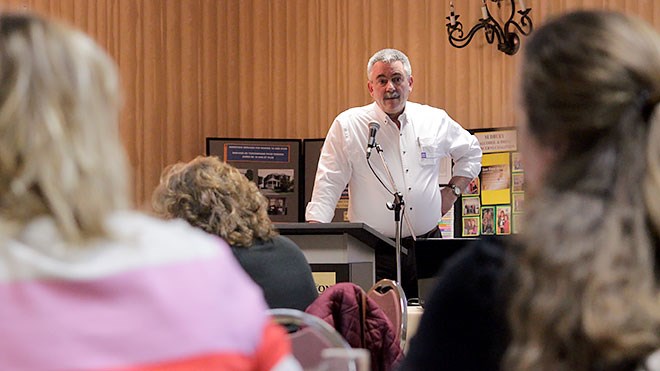A Greater Sudbury physician specializing in addiction medicine is calling for increased awareness and action on what he calls an "extremely dire" opioid crisis in Northern Ontario.
Dr. Mike Franklyn spoke to Sudbury.com ahead of his presentation at a luncheon hosted by the Sudbury Alcohol and Addiction Concerns Coalition at the Lexington Hotel on Feb. 7.
"The number of narcotics prescribed per capita — we're the highest," said Dr. Franklyn. "The number of overdose deaths — we're the highest. Number of hospital re-visits — we're the highest.
"We are at the pinnacle, the epicentre of an opiate crisis."
The luncheon was held to raise awareness of the services offered locally in the community and to offer those working in the field — social workers, medical professionals, law enforcement and members of the public — an opportunity to make connections.
Adam Dufresne, a registered social support worker, served as a spokesperson for the event.
"Finding the right service for the right person at the right time has been a challenge, and it's also the solution," said Drufresne. "There are gaps in the system, such as getting help to those who need it when they need it.
"Organizations have limited capacity, limited resources available, and we're trying to work more effectively for the sake of our clients who need to learn more about what services are available and how we can work together."
Franklyn leads Sudbury's Rapid Access Addictions Medicine (RAAM) clinic, one of seven in Ontario. Opened in Dec. 2015, the RAAM clinic offers individuals dealing with addictions early, assertive treatment to help manage cravings and withdrawal symptoms, while alleviating the burden on other points of care.
Franklyn said unfortunately many people struggling with addiction end up in the emergency room, which is not properly equipped to help them. And many of the individuals he sees are "orphan patients" who don't have family doctors. They often seek treatment in walk-in clinics, which are also not the best place to get help.
For those lucky enough to have a family physician, Franklyn said most family practitioners just don't have the right tool kit to offer the kind of help those patients need.
But, Franklyn said, as far as he's concerned, the No. 1 barrier to treatment is the stigma addiction carries, a stigma enforced on the societal level, but also internalized by many addicts, who avoid feeling like they're being judged by avoiding seeking treatment.
Franklyn makes the case that, even if you're not particularly interested in addictions treatment or helping others, substance abusers are huge consumers of health care. He argues there are very good financial reasons for society to help people struggling with addiction — helping them get clean takes a big burden off the health-care system.
Both the Sudbury Alcohol and Addiction Concerns Coalition and the RAAM Clinic are working to smooth the "care pathways" patients seeking help for addiction have to follow.
Franklyn explained that when care is available — and often, it isn't — it's very fragmented. Prevention, therefore, is often more important than treatment itself.
"We're using very potent drugs and we're seeing a trend where people are moving away from popping them and snorting them to injection drug use, and that's where we're seeing the overdoses," he said. "A lot of this stuff isn't sexy, but what we call in the business 'determinants of health' — dealing with mental health issues, poverty, the things that will lead people down that road — that's one big thing. Another is improved and more responsible prescribing by physicians."
The Sudbury Alcohol and Addiction Concerns Coalition will host another event on April 20 entitled "Marijuana: What you really need to know?"
